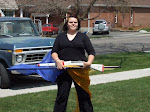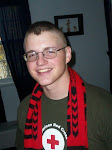“Genelle Harrell”—Remarks by Jack Harrell
April, 17, 2009
Genelle Williams was 16 and pretty when Jim Harrell told her father he was taking her to town to get her teeth fixed. Jim and Genelle came back the next day having married in Kentucky, where parental consent wasn’t needed. Their 27-year marriage was tumultuous because of choices they both made. Toward the end of their marriage, after years of fighting, after all the financial feast or famine, Mom had a nervous breakdown. She overdosed on pills and alcohol, and the doctor said she wouldn’t come out of it. But she woke up the next day as if nothing had happened. She never abused substances again. Soon Mom and Dad divorced.
This was the beginning of a second life for her. Jerry and Peggy were in Kansas. Sharon was married, and then Pat got married. I was five when Mom and I moved into the little pink house in Parkersburg. Mom couldn’t have bought that house without a lot of help from Sharon and Dick, and from her good friend Ray Burgener. My mom’s second life was a good life, a life of work and simple satisfaction and focus on the right things. Through it all, she proved that a person could start over and do better the second time.
In the little pink house, there was no shouting or fighting, no overturned dinner tables, no financial roller coaster ride. For 17 years, Mom worked in the Housekeeping Department at Richland Memorial Hospital in Olney, Illinois. She made beds, mopped floors, and cleaned at a starting wage of $1.25 an hour. She only missed one day of work at the hospital, when southern Illinois got a foot of snow overnight and state highway 130 was closed. I estimate that she walked about 15,000 miles in the hallways of Richland Memorial over those 17 years. Her feet would get tired, but she’d say, “Feet, you gotta do it.” She retired in 1984 as supervisor of the department, receiving the hospital’s Employee of the Year award.
A few years after Mom bought the pink house, Ray moved in with us. Mom and Ray were two broken lives that came together. Out of what was broken, they made a home that was physically stable and emotionally secure for the three of us. They both needed a safe house, I think. I’ll forever be grateful for the home they built together.
At the end of the work day, Mom would come home and put her pocket change in a jar. When the jar was full, she’d roll the coins and take them to the bank. She paid her bills on time, bought clothes at discount stores and day-old bread at Bunny Bread. Eventually, she paid off the mortgage on the little pink house. When she retired, she had several thousand in the bank.
Ten years after retiring, Mom could no longer take care of herself and Ray both. Until then they’d gone for walks every day, spent their money on small luxuries, visited us out west.
In 1995, she moved in with Sharon and Dick here in Utah. Mom insisted on paying a little bit each month for room and board. She had her bedroom, with an adjacent bathroom. She called it her apartment. She could go to the kitchen to cook and read the paper. She had her political TV and radio shows to watch and listen to. Sometimes she talked to the TV set, saying, “Liar, liar, liar,” when a Democrat spoke. (Perhaps the real cause of her death was the election of President Obama. A democratic president and Congress was just too much.) Above all, she took care of herself as much as she could. She wanted to pay her own way. She didn’t want to be a burden.
As her health got worse, though, it became harder for Mom to do for herself. She didn’t want to languish in a nursing home. “There’s old people there,” she’d say. It was such a blessing that her last conscious moment was in the kitchen, leaning on the counter, reading the newspaper. Sharon was there, pouring a cup of coffee when Mom collapsed. Mom hung on another 24 hours in the hospital, but she never regained consciousness. Maybe she took a last look at the newspaper and decided there was nothing left for her on this earth. So she made a clean break.
One of the great loves of her life was music. I never heard Mom say the words, “Turn that music down.” She loved music of all kinds. In the early 1930’s, she and her sister Ellen were a teenage music duo. They both sang and Mom played the guitar, fiddle, and mandolin. They could make five dollars a show—enough to pay Grandpa Williams for gas and each buy a dress for a dollar or two apiece. They once were broadcast live on WLS radio in Chicago. Just this week I learned that Mom and Dad often sang together in clubs. Dad played guitar and Mom played fiddle.
In the late 1970’s, when I was a teenager in a rock band, Mom and Ray would sacrifice two nights a week, leaving the house and spending the evening with Sharon and Dick so my band could practice in the living room of the little pink house. She liked all the songs our band played, but the one she always requested was Lynard Skynard’s “Gimmie Three Steps.” Years later, living with Sharon and Dick here in Utah, Dick would drive her to a doctor’s appointment and put Ernest Tubb or Jerry Lee Lewis in the CD player. “Turn it up,” Mom would say. She liked piano music and twin fiddles and steel guitars. If the music had a solid beat and the musicians were talented, she loved it.
Mom had a lot of Genelle-isms, expressions that seemed unique to her. If she was surprised by something, she’d say, “I never seen the like.” If she was astonished or amazed, she’d say, “I’ll swan to my soul.” She also liked to kid, “Do it my way, you might like it.” In making arrangements for this service, we wanted to keep things informal. It would be too easy to imagine Mom saying, “There ain’t no sense in that” if we went overboard on ceremony. In our family, we like to tease each other and exaggerate, just for fun. I might tell mom I had a case of beer in the car and planned on drinking it while I was away from BYU-Idaho. Or Dick might say Mom had been gone all day with a new boyfriend she’d picked up at Wal-Mart. In the face of our teasing, Mom would answer, “You’re the lyin’-ist bunch of people I ever seen.”
Mom often made us smile when she got words and phrases confused. In the morning she ate “breakwust.” Every few months she went to the beauty shop and got a “permlent.” She worried about Sharon’s “40K1.” And she talked about people in “the LSD church.” Until her death she thought my wife’s brother Kurt was named Kirk. As a boy, I often heard her refer to see-same hamburger buns. When I was a teenager, I looked at the package myself and realized it said “sesame seed” buns. Yes, she quit school after the 9th grade, but she was a smart, practical woman who fared well, even if she didn’t read all the labels right.
All her life Mom believed in Christian principles. Her brother, Bernard, whom she deeply admired, had studied to be a minister. She loved to hear him read from the Bible. She had great respect for the scriptures, largely because of the beautiful things Bernard found in their pages. Mom usually worked on Sundays and rarely went to church before she retired. She joined the LDS church in 1987, though, attending the Olney Branch and serving as chorister. Once in Utah, she enjoyed watching LDS General Conference and other shows on BYU television. Mom believed in a God who loves and understands his children and will righteously judge the world someday. In her last months, when she struggled with her health, or when she saw discouraging news on TV, she’d say, “Old Scratch is around the corner,” calling the devil by that old country name she’d learned growing up in Illinois.
Most of all, Mom loved her children, grandchildren, and great grandchildren. These past few months her health was bad enough that she had a hard time getting in and out of bed alone. A month ago, after a night in the hospital, the physical therapist told her she “showed a lot of potential.” Before that she’d gotten discouraged. But then she rallied. She wanted to get better so she could make Sharon’s “breakwust” in the morning. Now, Sharon is a grown woman and doesn’t need anyone to make her breakfast. But Mom wanted to. Cooking a meal, washing a dish, making a phone call, or sending a card were some of the small ways Mom showed her love.
I think the deepest way she showed her love to others was by letting people do things their own way, and asking the same for herself. “That pleases me,” she’d say when mutually agreeable arrangement were made. When I would ask her about preferences for Christmas visits or meals or gifts, she’d say, “You kids just do what you need to do.” She respected and accommodated the wishes of others. But she wasn’t a doormat. She wanted others to do what they needed to do, and she claimed the same for herself.
On Sunday morning, while Cindy and I were in church, Sharon left a message on our answering machine in Rexburg, Idaho. Sharon said the doctor didn’t think we’d make it down before Mom passed away. Cindy got the phone message first and called Sharon. Then we started packing. Because I was in a hurry, I thought, “I don’t have time to grab another pair of socks.” Then I realized what Mom would say, almost as if I’d heard her voice: “Go get another pair of socks. You do what you need to do.” I felt calm from that moment on.
Of course, Mom surprised us all by hanging on for 24 hours, making us all marvel at her strength. “She’s a fighter,” we all said. “She’ll go when it’s her time,” Sharon said. I felt calm and assured all through the night. The security I felt in my heart came from my lifetime of dealings with Genelle Harrell. Even if she passed away, her love and goodness would be steady. Our love for her would be the same. There was no need for panic or doubt. As we waited up all night long with Mom, we watched her breathing grow slower. We knew she was passing. We were sad and often teary, but not frightened.
I knew driving down from Idaho that I would cry. I knew I’d cry a lot. But I wouldn’t cry out of sadness for her death. Instead, I’d cry from joy and gratitude for her life. Now that I’m almost finished reading this, I’ll cry because I’m so grateful and happy that I ever knew Genelle Harrell, my mom—our mom, Genelle, our “Grandma Nelle.”
I guess to close...My grandmother was a wonderful woman and grandmother. I will always miss her. Luckily i have great memories of her and she will be in my heart forever. I beleive that i will see her in the afterlife. At least now she has no more pain. Grandma...i love you.
Thursday, April 23, 2009
Subscribe to:
Post Comments (Atom)




That was beautiful, thank you for sharing.
ReplyDeleteI love the part about the Democrats, lol